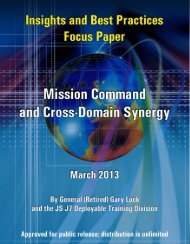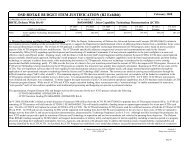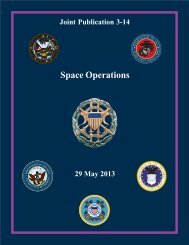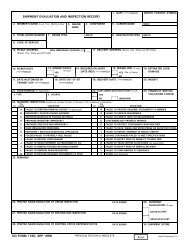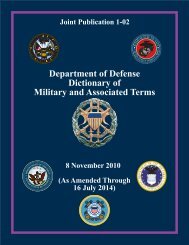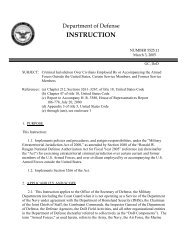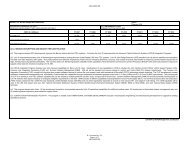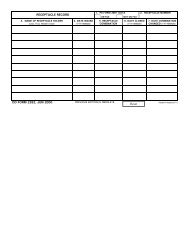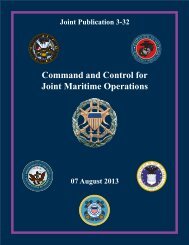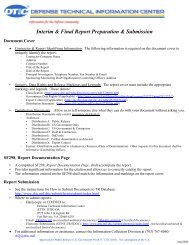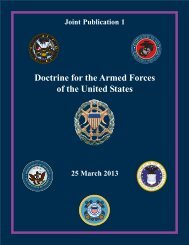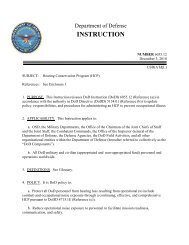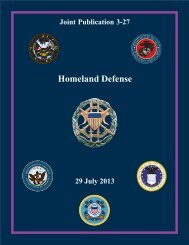JP 3-16, Multinational Operations - Defense Technical Information ...
JP 3-16, Multinational Operations - Defense Technical Information ...
JP 3-16, Multinational Operations - Defense Technical Information ...
Create successful ePaper yourself
Turn your PDF publications into a flip-book with our unique Google optimized e-Paper software.
Chapter I<br />
nation (Australia, Canada, France, Germany, Italy, United Kingdom, and US) <strong>Multinational</strong><br />
Interoperability Council (MIC). The US also participates in the five-nation (Australian,<br />
Canadian, New Zealand, United Kingdom, and US) Combined Communications-Electronics<br />
Board (CCEB) that enables strategic and deployed force headquarters (HQ) information and<br />
data exchange, and interoperability of communications-electronics systems above the tactical<br />
level of command, and the Australian, Canadian, New Zealand, United Kingdom, United<br />
States (AUSCANNZUKUS) Naval command, control, communications, and computers<br />
organization working to achieve standardization and interoperability in communications<br />
systems.<br />
(2) Alliances provide a forum to work toward standardization of national<br />
equipment, doctrine, and TTP. Standardization is not an end in itself, but it does provide a<br />
useful framework for commanders and their staffs. Coalitions, however, are by definition<br />
created for a single purpose and usually (but not always) for a finite length of time and, as<br />
such, are ad hoc arrangements. They may not provide commanders with the same<br />
commonality of aim or degree of organizational maturity as alliances.<br />
(3) Alliances usually have developed a degree of standardization with regard to<br />
administrative, logistic, and operational procedures. The mechanisms for this<br />
standardization are international standardization agreements (ISAs). ISAs can be materiel or<br />
nonmateriel in nature. Nonmateriel related ISAs should already be incorporated into US<br />
joint and Service doctrine and TTP. The five paragraph operation order is one common<br />
example. Materiel ISAs are implemented into the equipment design, development, or<br />
adaptation processes to facilitate standardization. In NATO, ISAs are known as<br />
standardization agreements (STANAGs) and allied publications (APs) and are instruments<br />
that are used to establish commonality in procedures and equipment. The ABCA Standards<br />
are another type of ISA. The existence of these ISAs does not mean that they will be<br />
automatically used during an alliance’s multinational operation. Their use should be clearly<br />
specified in the OPLAN or operation order. In addition, these ISAs cannot be used as<br />
vehicles for obligating financial resources or transferring resources.<br />
(4) <strong>Multinational</strong> publications (MPs) are a series of unclassified ISAs specifically<br />
developed by NATO. MPs provide signatory nations with common doctrine, TTP, and<br />
information for planning and conducting operations. These publications are available to all<br />
nations through a NATO sponsor.<br />
(5) Standardization agreements like APs, MPs, STANAGs, and ABCA Standards<br />
provide a baseline for cooperation within a coalition. In many parts of the world, these<br />
multilateral and other bilateral agreements for standardization between potential coalition<br />
members may be in place prior to the formation of the coalition. However, participants may<br />
not be immediately familiar with such agreements. The MNFC disseminates ISAs among<br />
the MNF or relies on existing standing operating procedures (SOPs) and clearly written,<br />
uncomplicated orders. MNFCs should identify where they can best standardize the force and<br />
achieve interoperability within the force. This is more difficult to accomplish in coalition<br />
operations since participants have not normally been associated prior to the particular<br />
contingency. The same considerations apply when non-alliance members participate in an<br />
I-8 <strong>JP</strong> 3-<strong>16</strong>



